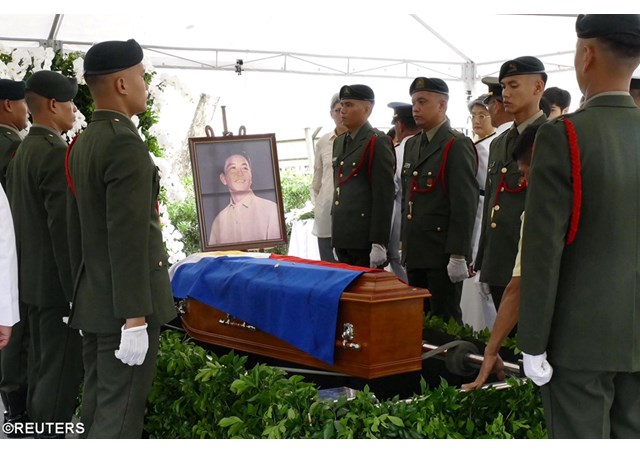
Philippines: Dictator Marcos given hero's burial despite protests

(Vatican Radio) Despite public opposition, Ferdinand Marcos, the late president of the Philippines, has been buried in a heroes' cemetery in the capital on Friday, in a ceremony shrouded in secrecy. The move has once again triggered protests across the country.
He is accused to have cheated his way to power and of torturing, abducting and killing thousands of opponents, as well as looting billions of dollars from the country.
Auxiliary Bishop Broderick Pabillo of Manila described the late dictator's burial in the Philippines' cemetery for heroes as "dishonorable." Fr Jerome Secillano, of the public affairs office of the bishops' conference, said it "desecrated the meaning of honor, nobility, and heroism."
Marcos was president of the Philippines from 1965 to 1986, when he was overthrown by a revolt - dubbed the People Power revolution - and forced to flee into exile to Hawaii, where he died in 1989. His body was returned to the Philippines in 1993 and has since been kept in a refrigerated crypt in a mausoleum in his hometown of Batac, Ilocos Norte, 470km north of Manila.
In 2004, Transparency International, the anti-corruption watchdog, named Marcos the second most corrupt leader of all time, behind Indonesian authoritarian ruler Suharto. The Philippines' foreign debt went from $2.67bn in 1972, when Marcos declared martial law, to $28.2bn in 1986, according to the World Bank.
Despite claims by the police that it was not an official state funeral, the ceremony began at noon on Friday, with a 21-gun salute as soldiers in parade dress and ceremonial rifles stood to attention at the Cemetery of Heroes in Manila, after his body was secretly flown to the venue in an apparent effort to avoid protests.
President Rodrigo Duterte, who was supported by members of the Marcos family in his presidential campaign, gave permission for the burial in August, calling Marcos a "Filipino soldier", and the Supreme Court ruled last week that Marcos could be entombed in the cemetery, where former presidents, soldiers and national artists have been interred.
The burial is an emotive issue in the Philippines, where a large part of the country views Ferdinand Marcos' 20-year rule as emblematic of the worst abuses of power.
So the funeral shocked many pro-democracy advocates and human-rights victims who planned several protests nationwide on Friday to oppose the burial.
The country's vice-president, human rights lawyer Leni Robredo, was among the critics, flatly declaring "Marcos is no hero" on Twitter.
Activist Bonifacio Ilagan, who was tortured under Marcos, told the Associated Press news agency the former leader was being buried "like a thief in the night".
But the late leader's eldest daughter, Imee Marcos, governor of the family's home state Ilocos Norte, thanked the country's president on social media for allowing the burial to happen.
Earklier, Philippine Catholic bishops had denounced a court decision allowing a hero's burial for the late dictator Ferdinand Marcos.
Archbishop Socrates Villegas of Lingayen-Dagupan, president of the Philippine bishops' conference, had said “It mocks our fight to restore democracy. I am puzzled and hurt, and in great grief.”
The prelate, a protege of the late Cardinal Jaime Sin of Manila who helped oust Marcos through the so-called "People Power Revolution" of 1986, had said he was "very sad" with the court decision.
(Source: Al Jazeera; BBC; UCANews)
| All the contents on this site are copyrighted ©. |


